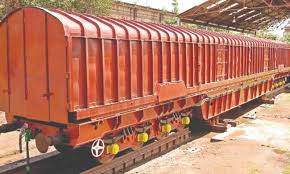Amid the clamour for slashing GST rates, rail manufacturers are seeking the opposite—an increase.
Amid the clamour for cuts in goods and services tax (GST) rates to help revive demand, rail manufacturers are seeking the opposite—an increase. Alstom General Electric and Bombardier, which have set up manufacturing facilities in the country for rail wagons, have written to the government, seeking a 12% GST levy on rail products from 5% now.
Inputs are levied GST of 5% and 18%, leading to an inverted duty structure as hundreds of crores of rupees in input tax credit are stuck, the companies say. This gives imported rail products an advantage as they just have to pay the 5% levy, frustrating the government’s aim to boost local manufacture.
“The restriction on refund of unutilised input GST credit on account of inverted duty structure has increased costs of the railway products manufacturing industry and gives a competitive disadvantage to domestic products vis-à-vis imported products, thereby adversely impacts Make in India initiative,” said Alstom India chief financial officer Simon Garnier.
Refunds of unutilised input tax credit on certain notified goods including railway products has been restricted. The products affected include locomotives, rolling stock, wagon and coaches. Garnier said the industry has been in continuous talks with the concerned authorities and expects the government to resolve this matter urgently to provide domestic companies a level playing field. They have lobbied the finance ministry, railways, the GST Council and state governments. They want the government to raise the GST on final products, allow input tax credit or lower the levy on inputs.
“GST is a positive step towards a simplified tax structure. However, rail industry suppliers are grappling with severe financial burden on account of inverted duty structure coupled with restriction on refund of unutilised credit,” said Nalin Jain, group president, equipment business, Wabtec Corp. Additionally, it was leading to an import bias with indigenous rolling stock costing more than imports.

